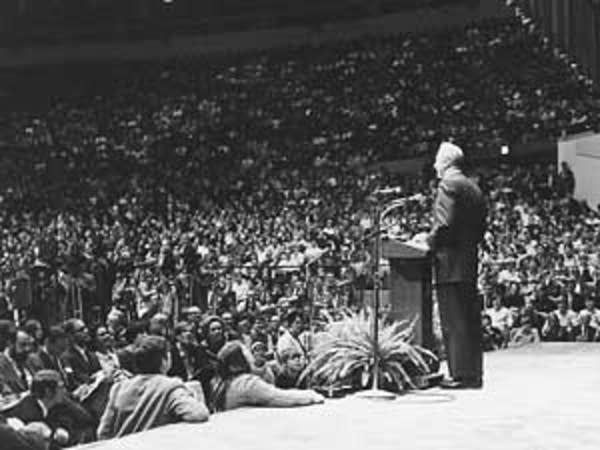Getting "Clean for Gene"

When Eugene McCarthy finished a close second in the New Hampshire primary, he delivered a stinging indictment against President Johnson and the Vietnam War. The entire complexion of the presidential race soon changed. So did the country.
COLLEGE STUDENTS FLOCK TO MCCARTHY'S CAMPAIGN
It was a time when young people were rejecting the established order in culture, education and politics. Many young people were drifting in 1968. Some found a new sense of hope and purpose through the candidacy of Eugene McCarthy.
"My name is Susan Speer and I'm 21, and my home is in New York. I go to school in Massachusetts."
Create a More Connected Minnesota
MPR News is your trusted resource for the news you need. With your support, MPR News brings accessible, courageous journalism and authentic conversation to everyone - free of paywalls and barriers. Your gift makes a difference.

McCarthy's Wisconsin campaign office in Milwaukee was packed with college students and recent graduates like Susan Speer. They were eager to help prepare for that state's primary on April 2.
"I'm in Wisconsin for the same reason that I was in New Hampshire, and that's to help Eugene McCarthy in whatever way I can to get the nomination," Speer said. "I feel as if there's something I can offer, and as long I feel that, I want to be here to be able to offer it."
College students from throughout the country showed up in large numbers to work for McCarthy in New Hampshire and Wisconsin. They cut their hair and shaved their beards, inspiring the slogan "Get Clean for Gene."
Sam Brown, 24, left Harvard Divinity School to work for McCarthy as his youth organizer.
"The young people thing is very easy. We've talked a long time. A lot of us have been marching a long time and have been out in the streets a long time, have gotten to pretty desperate levels. And it looks to me like there's one guy who had the courage to stand up and to be counted," said Brown.

"I think that the young people who are campaigning, those from New Hampshire and those who have come in from outside the state, have given an air of dignity and of deep responsibility to this campaign," McCarthy said.
But while he praised his young followers publicly, behind the scenes he often kept them at arm's length. Dominic Sandbrook says McCarthy was never willing to embrace the youth movement that surrounded him.
"I think because it was a movement that he hadn't really instigated -- it sprung up around him despite himself. He didn't really welcome the students' support; he didn't expect it," said Sandbrook. "They often stood for things that were a lot more radical or left-leaning than he did."
Americans of all ages knew who Eugene McCarthy was by March 1968, although some people still confused him with the red-baiting Wisconsin Sen. Joseph McCarthy who had died a decade earlier.
The Minnesota McCarthy was a devout Roman Catholic, who as a young man had studied briefly to become a Benedictine monk. Those Catholic roots shaped McCarthy's political philosophy.
FELT SLIGHTED BY LBJ
Dominic Sandbrook says McCarthy was an idealistic man who entered politics for noble reasons. But he had difficulty working with other people, and that flaw limited his political success.
"He was a man of enormous pride -- enormous ability and quite justified pride -- but somebody who didn't take well to slights, to reverses, to defeats," said Sandbrook. "And that's not always an asset in politics because I think you have to have quite a thick skin to be successful. And, McCarthy didn't have a thick skin -- nobody would dispute that."

Sandbrook says McCarthy felt particularly slighted by Lyndon Johnson four years earlier, in 1964. Johnson was seeking a vice presidential running mate and briefly dangled the job before McCarthy. He eventually picked another Minnesota senator, Hubert Humphrey. McCarthy had been a strong Johnson supporter. He even backed Johnson's Vietnam policy in 1964.
McCarthy voted in 1964 -- along with nearly all of his Senate colleagues -- for the Gulf of Tonkin resolution, which sanctioned retaliation for the alleged attack and gave President Johnson the approval needed to increase U.S. military involvement to protect South Vietnam.
"Here's an area which is of no special economic advantage to us, no special political advantage and no special military advantage. But rather, one in which we undertake to preserve peace and the conditions in which people can live with some measure of happiness and some measure of freedom," McCarthy said in 1964.
But two years later, McCarthy was an outspoken critic of the war. He had watched the death toll rise and the administration's objectives shift. McCarthy was particularly concerned about the intensified bombing of North Vietnam.
LBJ WORRIED ABOUT MCCARTHY'S INFLUENCE
President Johnson was concerned about McCarthy. Johnson had grown tired of reading in newspapers about McCarthy's criticism of the bombing raids. Johnson called McCarthy from the White House in February 1966. The president invited McCarthy to a private briefing with Gen. Maxwell Taylor.

"So if you will, I want Taylor to sit down and reason with you," Johnson said to McCarthy. "And I'd like for it to be quiet and off the record, and I don't want senators saying that I'm trying to sell them a damn thing."
Johnson then called Gen. Taylor. "I've got a little labor of love. I think this fellow McCarthy is an intellectual and one of our problems, and he keeps saying that he sees no reason for the bombing and no case for the bombing," Johnson said.
McCarthy then became an even greater problem for Johnson.
"The war is not morally justified, and therefore it must be questioned. It must be challenged, and it must be opposed," McCarthy said.
With the backing of peace activists, McCarthy marched ahead in early 1968 as the lone challenger to LBJ and the war.


